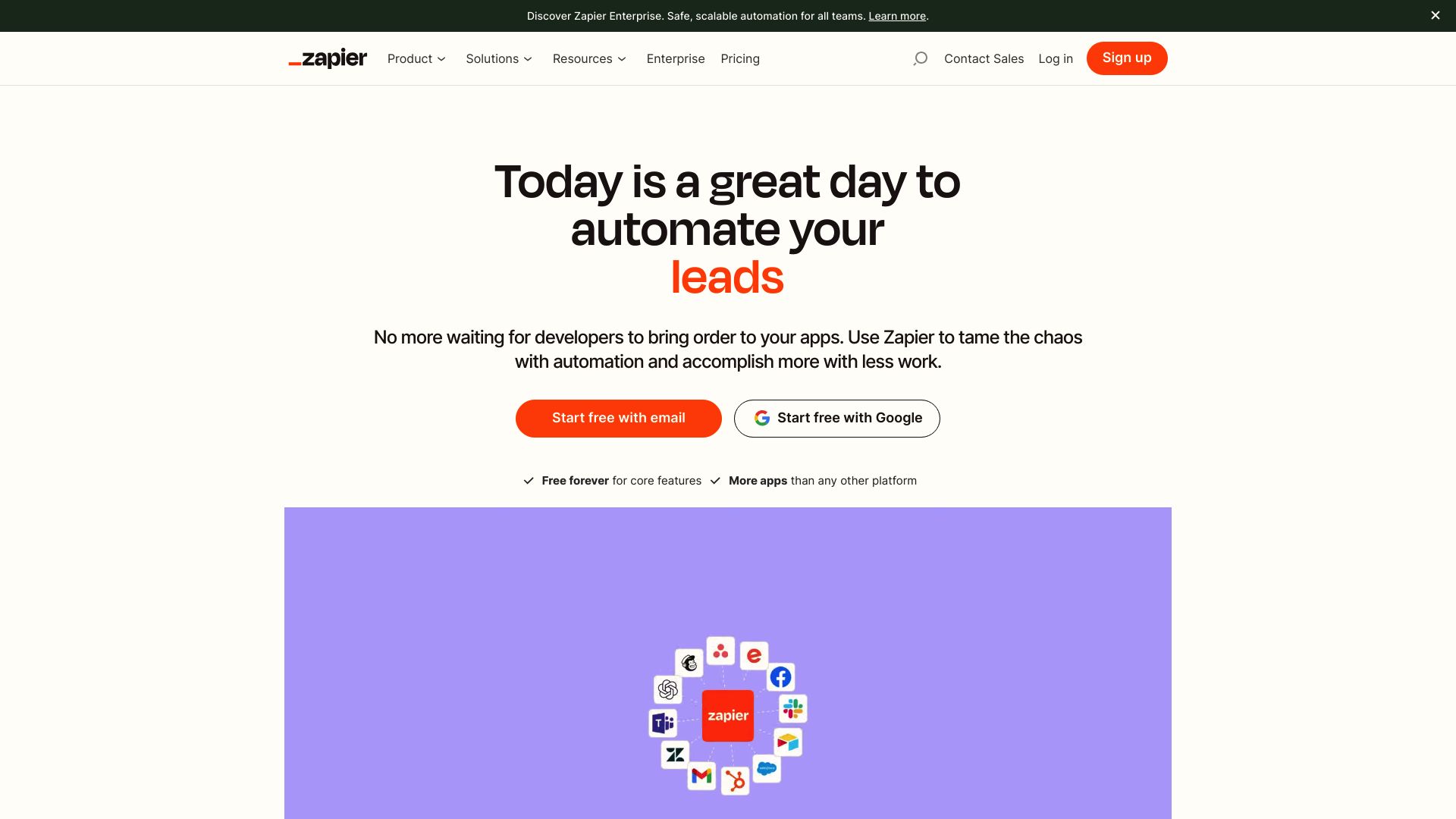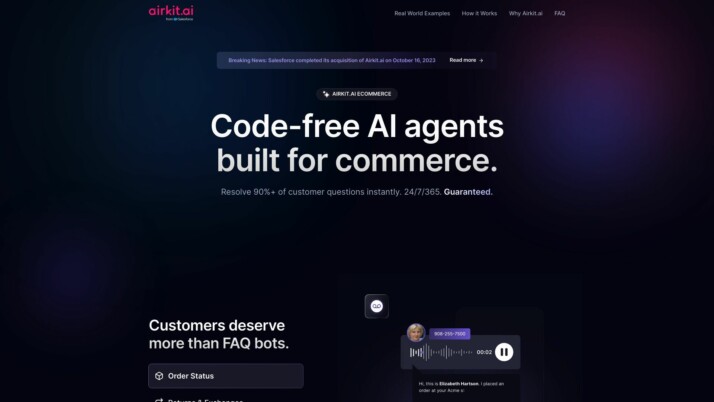Zapier vs. Airkit AI: Comparing Automation Platforms
AI-powered automation transforms how businesses operate, streamline workflows, and enhance customer experiences. This comparison examines Zapier vs. Airkit AI, and SmythOS, three platforms at the forefront of this revolution. Zapier connects apps and automates tasks, Airkit AI deploys AI agents for customer support, while SmythOS offers a comprehensive solution for building and deploying advanced AI systems. We’ll explore their features, strengths, and limitations to help you choose the right tool for your automation and AI needs. Whether you’re a developer seeking powerful integrations, a business leader focused on scalability, or an entrepreneur looking for accessible AI solutions, this guide provides insights to inform your decision-making process.
Zapier Overview
Zapier empowers users to automate workflows by connecting over 6,000 apps and services without coding. The platform’s visual interface lets anyone create multi-step ’Zaps’ that trigger actions across different tools when specific events occur.


Zapier’s strength lies in its extensive library of pre-built integrations, covering popular business tools like G Suite, Slack, and Salesforce. Users can quickly set up automations for tasks like adding new leads to a CRM when they fill out a web form or posting social media updates when blog content publishes.
Zapier empowers users to automate workflows by connecting over 6,000 apps and services without coding.
While powerful for connecting existing services, Zapier lacks true AI agent capabilities. It doesn’t offer natural language processing, machine learning, or autonomous decision-making features found in dedicated AI platforms. This limits its ability to handle complex, context-dependent tasks or engage in human-like interactions.
Developers can extend Zapier’s functionality by creating custom integrations using the Zapier Platform CLI. This allows for more tailored automations, though it requires programming skills. The platform also provides robust monitoring and logging tools to track automation performance and troubleshoot issues.
Zapier’s focus on integration and workflow automation makes it an excellent choice for streamlining repetitive tasks across multiple apps. However, users seeking advanced AI capabilities or autonomous agents may find its feature set limiting compared to specialized AI development platforms.
Airkit AI Overview
Airkit AI transforms customer service with its no-code AI agent platform. Recently acquired by Salesforce, Airkit empowers businesses to deploy intelligent, automated support agents without coding expertise. The platform excels at resolving common ecommerce queries related to orders, returns, and product information.
Airkit’s cloud-based solution scales automatically to handle demand spikes. Pre-built conversational skills tailored for ecommerce allow rapid deployment of AI agents that can instantly resolve over 90% of repetitive customer requests. The platform integrates seamlessly with existing help desk and CRM systems, enhancing rather than replacing current workflows.


Pre-built conversational skills tailored for ecommerce allow rapid deployment of AI agents that can instantly resolve over 90% of repetitive customer requests.
Continuous learning capabilities enable Airkit’s AI agents to improve their resolution rates over time. By automating routine support tasks, the platform prevents agent burnout and frees human staff to focus on complex issues. Airkit’s vision centers on delivering personalized, 24/7 AI-powered support to improve customer experiences.
While powerful, Airkit lacks some advanced AI features like autonomous agents or multi-agent collaboration. Its focus on ecommerce may limit applicability for businesses in other sectors. The recent Salesforce acquisition also raises questions about future pricing and integration options for non-Salesforce users.
Airkit’s emphasis on rapid deployment and ease of use makes it an attractive option for businesses seeking to quickly augment their customer service capabilities with AI. However, organizations requiring highly customized AI solutions or advanced machine learning capabilities may find Airkit’s no-code approach limiting for complex use cases.
Feature Comparison
Zapier and Airkit AI offer distinct approaches to automation and AI integration, with notable feature gaps between them. Zapier excels at connecting existing web services and APIs, allowing users to create automated workflows without coding. Its extensive library of pre-built integrations covers over 6,000 apps, making it ideal for streamlining repetitive tasks across multiple platforms. However, Zapier lacks true AI agent capabilities, limiting its ability to handle complex, context-dependent tasks or engage in human-like interactions.
In contrast, Airkit AI focuses on deploying intelligent, automated support agents for customer service, particularly in the ecommerce sector. While Airkit provides pre-built conversational skills and continuous learning capabilities, it doesn’t offer the same breadth of app integrations as Zapier. Airkit’s no-code AI agent platform allows rapid deployment of automated support, but it may not be as versatile for general workflow automation across diverse business processes.
Both platforms have limitations in core components and security features compared to more advanced AI development platforms. Neither offers hosted vector databases, multi-agent collaboration, or advanced problem-solving capabilities. Additionally, they lack some of the sophisticated security measures found in enterprise-grade AI solutions, such as granular IP control or comprehensive audit logs for analytics. Users requiring these advanced features or seeking to build highly customized AI agents may find both Zapier and Airkit AI limiting for complex use cases.
Feature Comparison Table
| Zapier | Airkit AI | SmythOS | |
|---|---|---|---|
| CORE FEATURES | |||
| AI Agents | ❌ | ✅ | ✅ |
| Hosted Agents (Dev, Production) | ❌ | ✅ | ✅ |
| Visual Builder | ✅ | ❌ | ✅ |
| Memory & Context | ❌ | ✅ | ✅ |
| Autonomous Agents | ❌ | ✅ | ✅ |
| Explainability & Transparency | ❌ | ❌ | ✅ |
| Debug Tools | ✅ | ❌ | ✅ |
| Multimodal | ❌ | ❌ | ✅ |
| Problem-Solving Capabilities | ❌ | ✅ | ✅ |
| Multi-Agent Collaboration | ❌ | ❌ | ✅ |
| Human-AI Interaction | ❌ | ✅ | ✅ |
| Audit Logs for Analytics | ✅ | ❌ | ✅ |
| Work as Team | ✅ | ❌ | ✅ |
| Agent Work Scheduler | ❌ | ❌ | ✅ |
| SECURITY | |||
| Constrained Alignment | ❌ | ✅ | ✅ |
| IP Control | ❌ | ❌ | ✅ |
| COMPONENTS | |||
| Foundation AIs | ❌ | ❌ | ✅ |
| Huggingface AIs | ❌ | ❌ | ✅ |
| Zapier APIs | ✅ | ❌ | ✅ |
| Classifiers | ❌ | ❌ | ✅ |
| Logic | ❌ | ❌ | ✅ |
| Data Lakes | ❌ | ❌ | ✅ |
| DEPLOYMENT OPTIONS (EMBODIMENTS) | |||
| Deploy as API | ✅ | ❌ | ✅ |
| Deploy as Webhook | ✅ | ❌ | ✅ |
| Staging Domains | ✅ | ❌ | ✅ |
| API Authentication (OAuth + Key) | ✅ | ❌ | ✅ |
| Deploy as Site Chat | ❌ | ✅ | ✅ |
| Deploy as Scheduled Agent | ❌ | ❌ | ✅ |
| Deploy as GPT | ❌ | ❌ | ✅ |
| DATA LAKE SUPPORT | |||
| Hosted Vector Database | ❌ | ❌ | ✅ |
| Sitemap Crawler | ❌ | ❌ | ✅ |
| YouTube Transcript Crawler | ❌ | ❌ | ✅ |
| URL Crawler | ❌ | ❌ | ✅ |
| PDF Support | ❌ | ❌ | ✅ |
| Word File Support | ❌ | ❌ | ✅ |
| TXT File Support | ❌ | ❌ | ✅ |
Best Alternative to Zapier and Airkit AI
SmythOS emerges as the superior alternative to Zapier and Airkit AI, offering a comprehensive AI agent development platform that combines ease of use with powerful features. Our drag-and-drop interface allows users to create sophisticated AI workflows without extensive coding knowledge, making advanced AI capabilities accessible to a broader audience.
Unlike Zapier’s focus on app connections or Airkit AI’s emphasis on customer service chatbots, SmythOS provides a versatile platform for building autonomous AI agents capable of handling complex tasks across various domains. We offer pre-built API integrations and support for multiple AI models, enabling users to leverage the latest advancements in artificial intelligence.
SmythOS excels in areas where Zapier and Airkit AI fall short. Our platform supports multi-agent collaboration, allowing teams of AI agents to work together on complex projects.
SmythOS excels in areas where Zapier and Airkit AI fall short. Our platform supports multi-agent collaboration, allowing teams of AI agents to work together on complex projects. We provide robust debugging tools, explainability features, and comprehensive audit logs, ensuring transparency and control throughout the development process. Additionally, SmythOS offers advanced security measures, including constrained alignment and IP control, addressing enterprise-level concerns that Zapier and Airkit AI may not fully cover.
With SmythOS, users gain access to a wide range of deployment options, from APIs and webhooks to site chat and scheduled agents. Our platform’s scalability and support for various data formats, including PDFs and word files, make it suitable for diverse use cases across industries. By choosing SmythOS, businesses and developers can unlock the full potential of AI automation, driving innovation and efficiency in ways that Zapier and Airkit AI cannot match.
Conclusion
Zapier and Airkit AI offer distinct approaches to automation, each with its own strengths and limitations. Zapier excels in connecting multiple apps and services, enabling users to create automated workflows without coding. Its extensive library of over 6,000 pre-built integrations makes it a versatile tool for streamlining repetitive tasks across various platforms. However, Zapier lacks true AI capabilities, limiting its ability to handle complex, context-dependent tasks or engage in human-like interactions.
Airkit AI, on the other hand, focuses on deploying intelligent, automated support agents for customer service, particularly in the ecommerce sector. While it provides pre-built conversational skills and continuous learning capabilities, Airkit’s scope is narrower than Zapier’s broad integration offerings. Both platforms have limitations in advanced AI features and security measures compared to more sophisticated solutions.
SmythOS emerges as the superior choice, offering a comprehensive platform for creating and deploying AI agents with unparalleled flexibility and power. Our drag-and-drop interface, extensive integration ecosystem, and support for multiple AI models make advanced AI functionalities accessible to users of all skill levels. SmythOS enables the creation of multi-agent systems, supports versatile deployment options, and provides robust security features, addressing the limitations found in both Zapier and Airkit AI.
For businesses and individuals looking to harness the full potential of AI, we invite you to explore SmythOS’s diverse range of AI-powered agent templates and experience unlimited AI automation risk-free. With our platform, you can deploy AI agents anywhere, revolutionizing your workflow and driving innovation across your organization. Dive into our comprehensive documentation to discover how SmythOS can transform your approach to AI integration and automation.
Last updated:
Disclaimer: The information presented in this article is for general informational purposes only and is provided as is. While we strive to keep the content up-to-date and accurate, we make no representations or warranties of any kind, express or implied, about the completeness, accuracy, reliability, suitability, or availability of the information contained in this article.
Any reliance you place on such information is strictly at your own risk. We reserve the right to make additions, deletions, or modifications to the contents of this article at any time without prior notice.
In no event will we be liable for any loss or damage including without limitation, indirect or consequential loss or damage, or any loss or damage whatsoever arising from loss of data, profits, or any other loss not specified herein arising out of, or in connection with, the use of this article.
Despite our best efforts, this article may contain oversights, errors, or omissions. If you notice any inaccuracies or have concerns about the content, please report them through our content feedback form. Your input helps us maintain the quality and reliability of our information.
